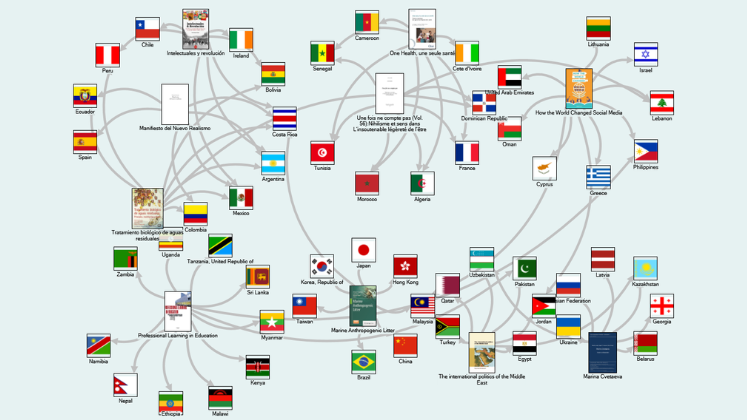In Global Language Justice, Lydia H. Liu and Anupama Rao bring together contributions at the intersection of language, justice and technology, exploring topics including ecolinguistics, colonial legacies and the threat digitisation poses to marginalised languages. Featuring multilingual poetry and theoretically rich essays, the collection provides fresh humanities perspectives on the value of preserving linguistic diversity, writes Andrew Shorten.
This blogpost originally appeared on LSE Review of Books. If you would like to contribute to the series, please contact the managing editor at lsereviewofbooks@lse.ac.uk.
Global Language Justice. Lydia H. Liu and Anupama Rao (Eds.)with Charlotte A. Silverman. Columbia University Press. 2023.
 Recently, scholars have been paying closer attention to the relationships between language and justice, leading to two separate but related strands of academic research. On one side, applied linguists are increasingly preoccupied with issues connected to social justice, race and gender. An example of this is Ingrid Pillar’s influential book Linguistic Diversity and Social Justice (Oxford, 2016), which explores how language hierarchies, ideologies and expectations affect people’s access to meaningful work and social participation. On the other side, political theorists are incorporating language into discussions about democracy and distributive justice, exploring how political communities should handle multilingualism and questioning whether people have justice-related claims or duties tied to the languages they use. A well-known example of this is Philippe Van Parijs’s book Linguistic Justice for Europe and the World (Oxford, 2011), which provocatively argues that native English speakers have a duty to compensate non-native English speakers since the latter group’s efforts contribute to a tremendously beneficial public good.
Recently, scholars have been paying closer attention to the relationships between language and justice, leading to two separate but related strands of academic research. On one side, applied linguists are increasingly preoccupied with issues connected to social justice, race and gender. An example of this is Ingrid Pillar’s influential book Linguistic Diversity and Social Justice (Oxford, 2016), which explores how language hierarchies, ideologies and expectations affect people’s access to meaningful work and social participation. On the other side, political theorists are incorporating language into discussions about democracy and distributive justice, exploring how political communities should handle multilingualism and questioning whether people have justice-related claims or duties tied to the languages they use. A well-known example of this is Philippe Van Parijs’s book Linguistic Justice for Europe and the World (Oxford, 2011), which provocatively argues that native English speakers have a duty to compensate non-native English speakers since the latter group’s efforts contribute to a tremendously beneficial public good.
Political theorists are incorporating language into discussions about democracy and distributive justice, exploring how political communities should handle multilingualism
Bringing together linguists with scholars from across the humanities, Global Language Justice throws new light on these and other, related, topics. Emphasising the relationships between language, environment and technology, and featuring both poetry and academic essays, this edited collection brings a fresh perspective on the emerging “ecolinguistics” research agenda, which explores the entanglements amongst struggles to protect biological, linguistic and cultural diversity. The book succeeds in bringing new issues to the fore, especially regarding the challenges of digitisation for language justice and the connections between coloniality and language justice. Another laudable feature of this book is that, far more than is typical for an edited collection of this type, it has the feel of a genuinely collaborative project, with frequent cross-referencing across the different chapters, most of which were first presented at a Mellon Foundation Sawyer Seminar, hosted by Columbia University.
The book succeeds in bringing new issues to the fore, especially regarding the challenges of digitisation for language justice and the connections between coloniality and language justice.
Many of the chapters centre the predicament of Indigenous languages and the experiences of Indigenous language activists. This marks a contrast with both strands of research mentioned earlier, which tend to focus on the claims of sub-state national minorities and, to a lesser extent, immigrants. Careful engagement with Indigenous scholars, activists and communities should prompt a reconsideration of some dominant linguistic and political categories. For instance, Wesley Leonard’s insightful contribution demonstrates how creative attempts to revitalise the once dormant myaamia language, led by Miami people themselves, destabilise assumptions about linguistic purism, language extinction, and the connection between language and identity. Furthermore, situating issues of language justice within a broader context of Indigenous politics and experiences can foreground phenomena often neglected by linguists and language rights scholars. For instance, Daniel Kaufman and Ross Perlin’s chapter reveals how bureaucratic and academic practices can render Indigenous languages invisible in urban metropolises like New York. They argue that this erasure can have material as well as recognitional costs, threatening the health and human rights of Indigenous people.
Whilst the importance of literacy for personal wellbeing, economic growth and gender equality are now well understood, the importance of mother-tongue education for developing literacy in the first place is less widely appreciated.
A second theme that emerges is the importance of language for sustainable development. Suzanne Romaine’s powerful chapter points out that although the most linguistically diverse places are inhabited by some of the world’s poorest people, development policies and practices generally neglect language. For instance, whilst the importance of literacy for personal wellbeing, economic growth and gender equality are now well understood, the importance of mother-tongue education for developing literacy in the first place is less widely appreciated. As a result, schools, states and international agencies still often prioritise the teaching of official and colonial languages, which results in low literacy rates and can have devastating effects for both individuals and society. Particularly striking are the facts that, globally, 40 per cent of people lack access to education in their own language, a proportion that rises to 87 per cent in Africa, where 90 per cent of people also cannot understand the official language(s) of their state.
Some lesser-used languages are virtually impossible to use online because their writing systems are not supported in Unicode, the international standard that ensures text can be reliably transmitted across devices and programmes.
A third theme explored relates to the presence and visibility of minoritised languages online. Isabelle A. Zaugg’s chapter discusses some of the ways in which digital technologies discourage the use of lesser-used languages online and thereby reinforce sociolinguistic inequalities. Part of the explanation for this is that only languages spoken in wealthy countries enjoy a full suite of digital supports, such as tailor-made fonts and keyboards, as well as tools like spellcheck, predictive typing and voice recognition. By contrast, as Deborah Anderson explains in her clear and useful chapter, some lesser-used languages are virtually impossible to use online because their writing systems are not supported in Unicode, the international standard that ensures text can be reliably transmitted across devices and programmes. In the future, encoding the scripts used by minority languages will become ever more essential for language maintenance and vitality, since Unicode underpins a myriad of important practices, from word processing and searching the internet to emailing and posting on social media. However, this process is both technically challenging and resource hungry, raising questions of justice for minority language speakers.
Though it is surely true that language justice requires thinking carefully about other political concepts […] we should be reluctant about abandoning rights-talk altogether.
Finally, a fourth theme of the book is a broad scepticism about language rights, primarily because of the ways in which rights are thought to be bound up with liberal individualism. This is suggested in a few contributions and defended most fulsomely in the chapter by L. Maria Bo. Though rights scepticism has a respectable tradition in political theory, this was one of the less convincing aspects of the collection, not least because the linguistic human rights approach, championed elsewhere by Robert Phillipson and the late Tove Skutnabb-Kangas, was never given a serious run for its money. Though it is surely true that language justice requires thinking carefully about other political concepts (such as democracy, as Madeline Dobie argues in her enlightening chapter on language politics in Algeria), we should be reluctant about abandoning rights-talk altogether. For one thing it is often favoured by language activists themselves, such as Gluaiseacht Cearta Sibhialta na Gaeltachta (The Gaeltacht Civil Rights Movement) active in Ireland in the 1960s and 70s. Furthermore, as Tommaso Manfredini demonstrates in his moving contribution about shortcomings in translation services for asylum seekers in Italy, rights and especially human rights cannot be ignored, since they provide the context and means with which language injustices can be most effectively challenged today.
Liu and Rao’s Global Language Justice is a stimulating addition to the burgeoning academic field of linguistic justice. It offers a fresh perspective from the humanities that will be especially welcome for scholars already immersed in the literatures in applied linguistics or normative political theory. Meanwhile, other readers will find much in its theoretically rich reflections on the predicament of minority languages, and their users, in the twenty-first century.
The content generated on this blog is for information purposes only. This Article gives the views and opinions of the authors and does not reflect the views and opinions of the Impact of Social Science blog (the blog), nor of the London School of Economics and Political Science. Please review our comments policy if you have any concerns on posting a comment below.
Image Credit: Alexandre Laprise on Shutterstock.







